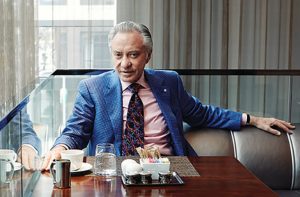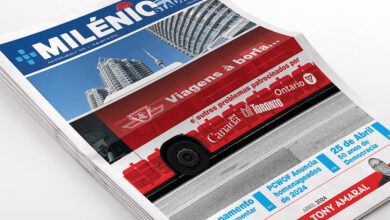We can’t understand the history of Toronto without mention Paul Godfrey. A businessman and former Canadian politician that during many years has made it a personal conquest to develop the city, from sports to media and politics. Godfrey was a North York alderman, Chairman of Metro Toronto, President of the Toronto Sun, President and CEO of Postmedia Network and chair of the Ontario Lottery and Gaming Corporation. Paul Godfrey campaign to bring the Blue Jays to Toronto and intends to do the same with the National Football League, a work still in progress.
Manuel DaCosta interviewed Paul Godfrey for Here’s The Thing (Camões Tv) giving the Portuguese community an opportunity to get to know better the man that influenced the city where we live in. Born and raised in the Kensington Market Area, Godfrey reminiscences on what Toronto was, all the contributes he made and what we can expect for the future.
Manuel Da Costa: What is your best recollection about being born and living at Kensington Market area?

Paul Godfrey: My grandmother and my parents lived on Oxford St., so I got the chance to know well the Kensington Market shopping area. I remember, as a little boy, going with my grandmother to have kosher chicken koshered. When I go on long walks, walking from Yorkville and Bay area down to Spadina and College, to reminisce about the place where I grew up. I went to Lansdowne public school in that area. I know the area quite well. At the time, Oxford St. was very interesting, because in the middle of the block there’s a moving company, on the other side of the road a grocery store. You don’t see that today; they are residential areas now. To top it all off, right next to the Kensington Market Place there was a Blacksmith, and we would often see horses being showed there. In those days, it was a different community that the one today. The Jewish community in which I was born into – I was born at Western Hospital nearby – it means a lot to me. I’ve taken some of my children and grandchildren through the area to prove that this is where I grew up. I’m very proud of the Kensington community.
MDC: I have very similar memories, that’s where I first established myself when I came to this country in 1970. Being a lifelong resident of Toronto, you have seen this city change considerably. What impresses and disappoints you the most?
PG: I think, Toronto, globally, has become one of the greatest cities in the world. In spite of an increase in crime, it’s still considered one of the safest cities. A city open to great tourism; we have great sports activities; great showbusiness activities; we are the center of finance for Canada. Those are the positive things. I’m disappointed in a number of things that I have seen today. I see a war against the automobile; streets being narrowed… I’m all for bike lanes in the city but some streets should have them; sometimes the bike lanes are made very wide, and they cut a lane of traffic. We are building a lot of public transit which I think is a good thing. We are developing the waterfront; it will be a major attraction. There’s no perfect city. Hopefully, our elected officials will provide a balance between the things they have to do and the things they must do.
MDC: In your time in government, as alderman for the city of Toronto and then Chairman of Metro Toronto, did you ever envision the development of the city as it is? And did you put certain plans or decisions in place that have affected the way the city has developed over the years?
PG: I hope I made a contribution. The city has grown tremendously. I think there are a lot of great things the city has done; the downtown is a very vibrant part of the overall GTA. There are a lot of cities in America in which the downtown areas have been abandoned; we were able to redevelop a lot of things. I live in a condo, above the Four Seasons Hotel as I look out the window, I see many high-rise buildings for residential and office purposes (a lot of them, unfortunately, closed during the pandemic). It’s very vibrant, very alive, there’s entertainment, great restaurants, various communities, we are sort of a melting pot. In the general downtown area, you get a taste of the world. People from all backgrounds can live side by side and they all take pride in promoting the part of the city in which they live in.
MDC: Paul Godfrey essentially personalizes this city. You have received many accolades, you have done a lot for the city, but one of the most important for you must have been receiving the Member of the Order of Canada. This recognition brings responsibility and the commitment to live a life in according to certain guidelines. What has it meant for you?
PG: Firs of all, I was greatly surprised, in 1999, getting a letter from the Governador General of Canada. I figured, why would he be reaching out to me? Somebody nominated me to become a Member of the Order of Canada and that was a great success. I proudly wear the little flower with the Order of Canada, every day. I guess I received it for being in public life for a number of years.
There were a lot of things important to me, during my years in public life. People know that I’m a sports bug, I realized that Montreal had a major baseball team and we only had hockey. It was my goal to try and encourage business to put some money in to see if we could have a baseball team. I guess I was in the right spot at the right time. I probably get more credit for it than I deserve, I didn’t do it by myself. At the time, Labatt’s brewery, Howard Webster who owned Globe and Mail at the time, the Canadian Imperial Bank of Commerce got together and helped campaign, along with a lot of other people that equally deserve credit.
I also felt that when I got a great opportunity to be a city builder, I recognize that doesn’t happen very often, and given the opportunity I felt I had to put things back into the community. While our three sons were growing up, my wife and I always had in our minds to teach them the importance of giving back to the community. We were very much involved in the hospital for sick children; the starting of the Herbie fund that brought children, who had life threatening problems, from all over the world to be undertaken in an hospital like Sick Kids. Now, I can see my sons and their families also contributing to the community in many ways, in a charitable way.
MDC: A Paul Godfrey is not born very often. We are already over 65 years of age and you continue to embrace projects at a pace that is hard to believe. Where do you get the drive to continue at this pace and getting involved in new things?
PG: I strongly believe that retirement is all dependent on a number of things. Fortunately, I don’t have to work anymore, but I want to work. As long as I have my good health, I’m willing to take on new ventures and responsibilities. That keeps your brain working. As you get older, you see a lot of people aging quickly from inactivity, both physical and mental. I decided as I approach the age of mid-fifties that I was going to work until I couldn’t work anymore. I wanted to take the opportunity to continue to do things for Toronto, Ontario and Canada, but at the same time, do something that is creative and challenging; I tried to follow that. Although I’m no longer the CEO of Postmedia, I’m still a Chairman at the Board; I’m seated at a number of Boards. It’s exciting for me every day. I wake up and I say, ‘Oh My God, I have so many things to do’ and the day just fly by. Even during the pandemic, we are doing things virtually now. I think that even after the pandemic, there’s going to be a lot of people travelling less, businesswise; they are going to do it virtually and save all the travel time. Airlines may be upset about that, but I think it will be a fact for life.
MDC: Your involvement in sports and media is legendary in this city. Bringing the Blue Jays to Toronto, being their President and CEO for eight years. It was a huge accomplishment. How important was Toronto becoming a major league city in sports? Including the fact that you are still interested in bringing the NFL to Toronto. How important is for a city, or country, to have teams of a certain caliber and what does that bring along?
PG: First of all, I think great cities of the world have to be socially, culturally and athletic complete. Sports is a very big component. All you have to do is to look back a couple of years when the Raptors won the NBA championship and in how millions of people flooded the streets of Toronto to welcome them back. It was amazing, people came from all over Canada. The Raptors were their team. Toronto was the only team in the national baseball association. Right now, unfortunately, Toronto is the only team in major league baseball. Montreal had a team and it moved to another city, Washington. I believe that someday Montreal should get its team back and create a natural, friendly, rivalry between Toronto and Montreal. It’s kind of odd that it was the presence of the Expos in Montreal that shone the light in Toronto; I just happened to be in the right place at the right time and convinced them that Toronto could also be a major league city. That happened with the help of a lot of people.
I also think that Toronto would be a great city to be the first city in Canada to have a National football team. There is no doubt that the Toronto is a major league city. The NBA is the best basketball major league in the world; the major league of baseball is the best in the world; we already have hockey and, hopefully, this year we can see a Stanley Cup win in the city, we haven’t had one since 1967. There’s great interest in football, Toronto would be a great city. I honestly believe that if the National football league team came to Toronto… which I’m still knocking on the door and I even told Commissioner Roger Goodell ‘I’m 82 years old, I’m not going to last forever, and my dreams need fulfillment in the football area’. I told him; I only have a couple of things in my bucket list. I’m still working on that. That will finish the sports chapter for Toronto.
MDC: One of the things that I do, with my team, in this community is to publish a newspaper, we have a TV station and radio. It’s becoming more and more difficult to keep these projects financially viable. I believe that ethnic media plays an important role in the fabric of this city and country. Given the status of media today, where more and more large corporations are laying off people and changing their way of doing things towards streaming… Where do you see the media communication going in the future?
PG: Let me start off with saying that the ethnic community plays a very important role, by getting factual information out to residents. Not everybody makes English their first language and it’s important that facts and figures of accuracy get played out.
The world has changed. The internet has changed everything. When I joined the Toronto Sun, back in 1984, when I left City Hall to be a press baron, as they called it in those days. First of all, I have to tell you, I really believe that almost anyone could have been a publisher of a newspaper; the phones kept ringing. The media lived off advertising, whether it was on television, on radio or on print. It was easy to make a lot of money. I remember in my first Board meeting, after being there for three months, I broke every record. I felt kind of proud of myself, but I shouldn’t because it was happening everywhere. While I was telling the board all these great numbers we had, one of the Directors stood up and said, ‘I told you and you… this company is so good that even Godfrey can’t screw it up’. Since that, the internet came along. In 2007, I left the newspaper business and went to Toronto Blue Jays at the time, I became Chairman of the Ontario Lottery and Gaming Corporation – it was kind of odd that they went to a conservative to run the OLG, but I was pretty proud of it. When I went back to run Postmedia, which owned the National Post in Toronto and the Toronto Sun, something had changed. Everyone tried to blame it on the recession we had, but I had a feeling it was a structural change. People were beginning to go online to see the news. At that time, between Google and Facebook, they began to dominate. We watched classified advertising almost disappearing. It really hasn’t stopped since. A lot of newspapers are closing their doors, not just here, but worldwide. All media is suffering today. You if start putting it together, we have Amazon, Netflix, Apple, and others that have taken all the advertising away. When I took over Postmedia, in 2010, we had 5,400 employees and by 2015 we were down to 2,800 employees. When we reacquired the Toronto Sun, it went back up to over 5,000 again and today, we are down to about 1,800 employees. A lot of jobs lost; a lot of revenue lost.
Google and Facebook face almost no taxes, they employ very few people. That’s why countries, like France and Australia and the European Union have been very tough in fine them for almost being a monopoly. Hopefully, things will change. The Government of Canada, after long hesitation, decided they will try and help newspapers and other media. If they don’t, we are going to lose all aspect of Canadian media. Radio and tv have been hurt; newspapers will be forced to unit in some way.







Redes Sociais - Comentários